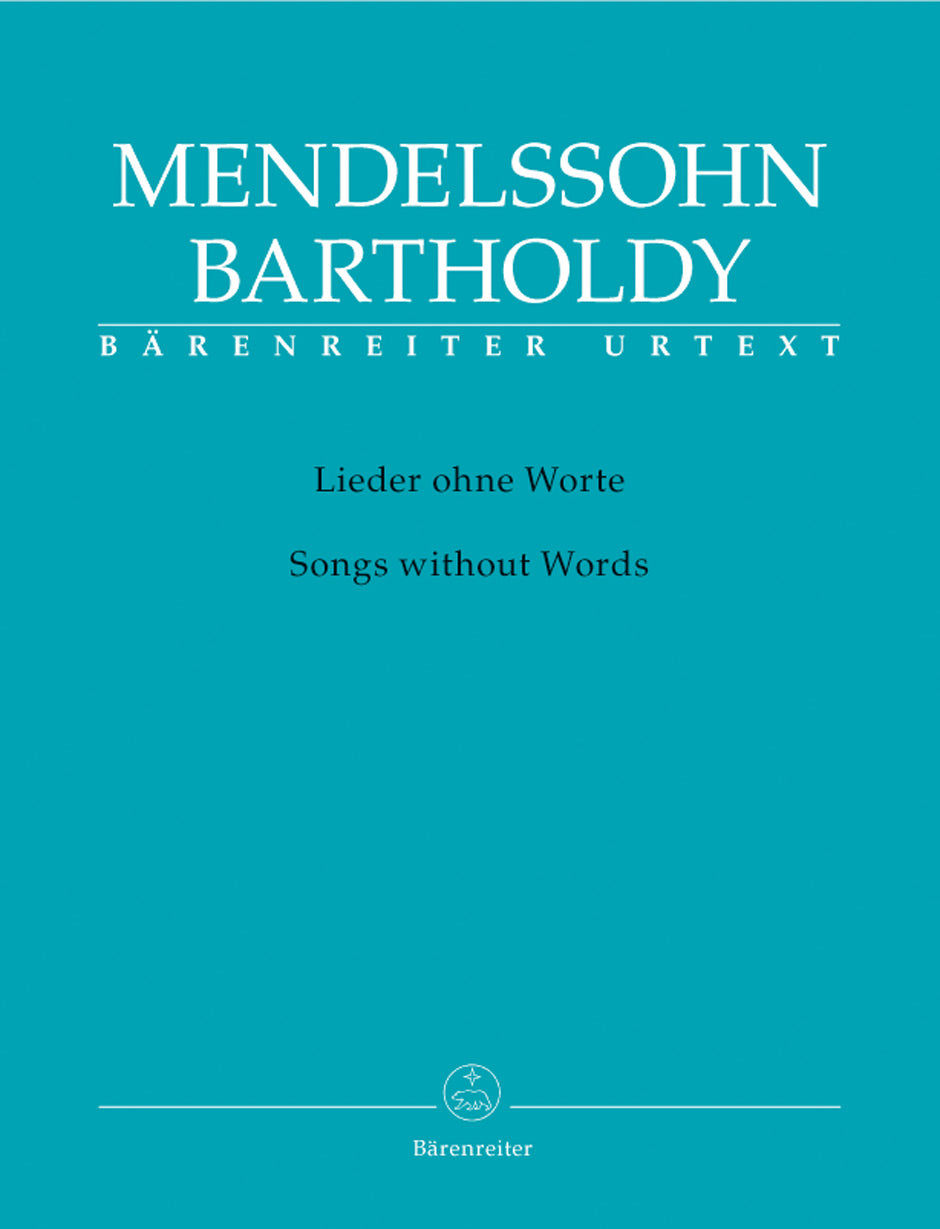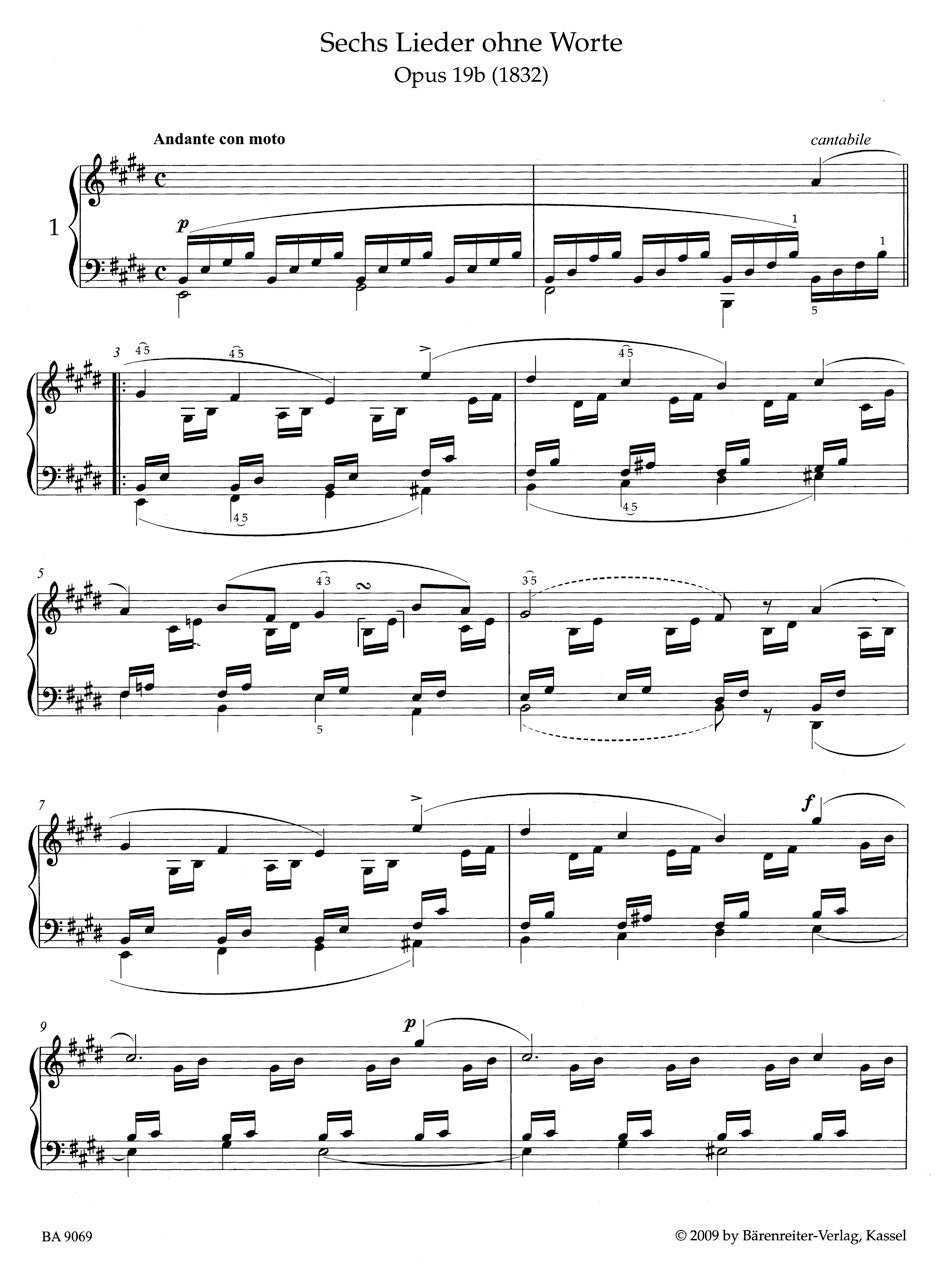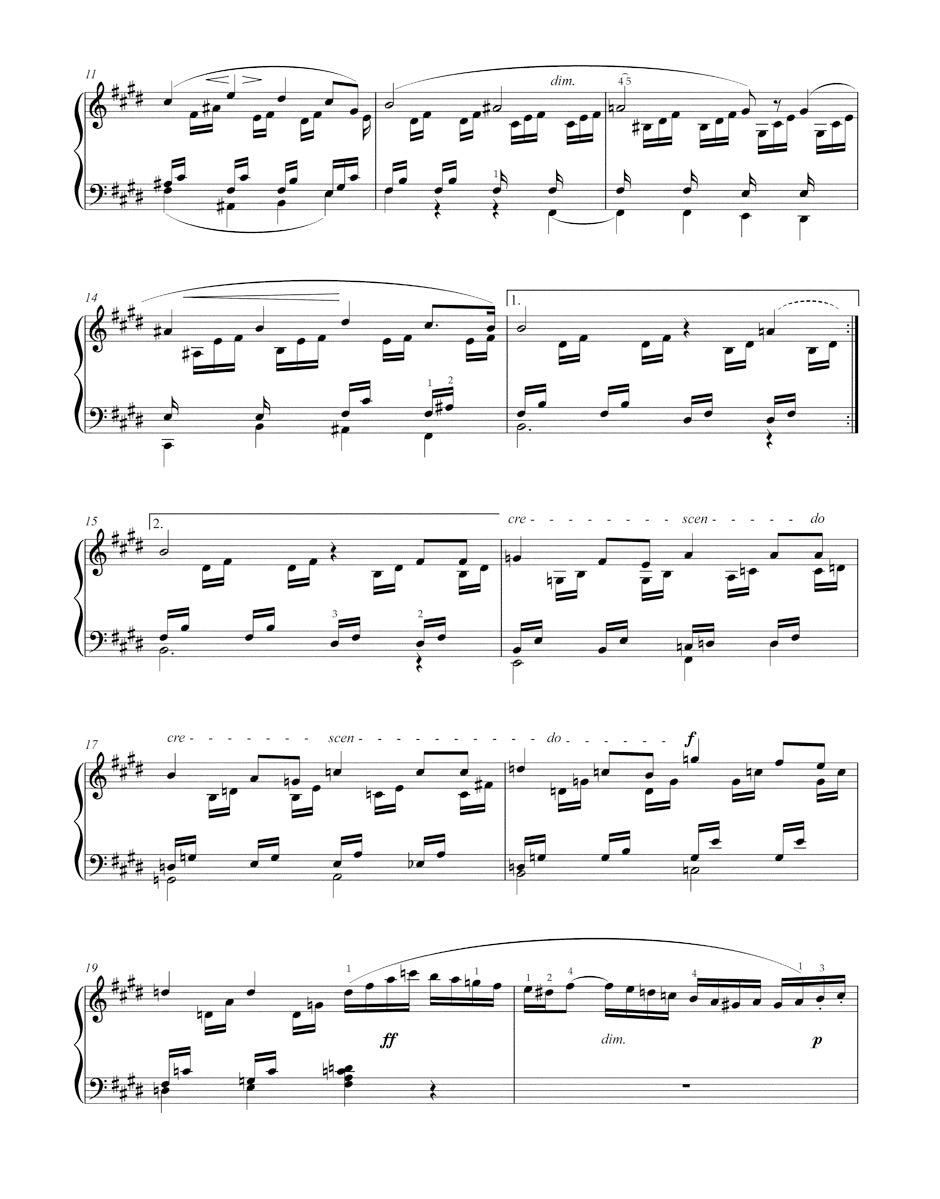Mendelssohn: Songs Without Words
In stock and typically ships within 1 business day.
- Composer: Felix Mendelssohn (1809-1847)
- Editor: R. Larry Todd
- Fingering: Matthias Kirschnereit
- Instrumentation: Piano
- ISMN:
- Size: 9.6 x 12.2 inches
- Pages: 213
- Urtext / Critical Edition
Description
This edition includes all the collections printed during Mendelssohns lifetime, together with those published posthumously. The appendix also contains a selection of the Lieder ohne Worte which have survived individually, including two pieces which have not been available in modern editions until now.
Fanny Mendelssohn received a lyrical piano piece as a birthday present from her brother Felix in 1828; he wrote it out in her music album, and she called it Lied ohne Worte (Song without Words). Mendelssohn wrote such songs for piano, true music, which fill a persons soul with a thousand better things than words, throughout his life. He himself saw six collections into print between 1832 and 1845. Two further collections containing pieces from the composers unpublished works were published posthumously.
As suited their character, Mendelssohn's Lieder ohne Worte were primarily rooted in domestic music-making in the home, in the middle-class parlours, between comfortable paintings and Biedermeier furnishings. Increasingly they came to be heard in the concert hall. in addition, travelling virtuosi took up these rather reserved pieces, helped popularise them and made them into what they still are today pillars of the repertoire.
Works:
- Andante con moto in E Major, MWV U 86, Op. 19b, No. 1
- Andante espressivo in A Minor, MWV U 80, Op. 19b, No. 2
- Molto allegro e vivace in A Major ("Hunting Song"), MWV U 89, Op. 19b, No. 3
- Moderato in A Major, MWV U 73, Op. 19b, No. 4
- Poco agitato in F-sharp Minor, MWV U 90, Op. 19b, No. 5
- Andante sostenuto in G Minor (Venetian Gondola Song No. 1), MWV U 78, Op. 19b, No. 6
- Andante espressivo in E-flat Major (Contemplation), MWV U 103, Op. 30, No. 1
- Allegro di molto in B-flat Minor (Unrest), MWV U 77, Op. 30, No. 2
- Adagio non troppo in E Major (Consolation), MWV U 104, Op. 30, No. 3
- Agitato e con fuoco in B Minor (The Wanderer), MWV U 98, Op. 30, No. 4
- Andante grazioso in D Major (The Brook), MWV U 97, Op. 30, No. 5
- Allegretto tranquillo in F-sharp Minor (Venetian Gondola Song), MWV U 110, Op. 30, No. 6
- Con moto in E-flat Major (The Evening Star), MWV U 121, Op. 38, No. 1
- Allegro non troppo in C Minor (Lost Happiness), MWV U 115, Op. 38, No. 2
- Presto e molto vivace in E Major (The Poet's Harp), MWV U 107, Op. 38, No. 3
- Andante in A Major (Hope), MWV U 120, Op. 38, No. 4
- Agitato in A Minor (Passion), MWV U 137, Op. 38, No. 5
- Andante con moto in A-flat Major (Duetto), MWV U 119, Op. 38, No. 6
- Andante con moto in A-flat Major (On the Seashore), MWV U 143, Op. 53, No. 1
- Allegro non troppo in E-flat Major (Clouds), MWV U 109, Op. 53, No. 2
- Presto agitato in G Minor (Agitation), MWV U 144, Op. 53, No. 3
- Adagio in F Major (Sadness of Soul), MWV U 114, Op. 53, No. 4
- Allegro con fuoco in A Minor (Folk Song), MWV U 153, Op. 53, No. 5
- Molto allegro in A Major (Flight), MWV U 154, Op. 53, No. 6
- Andante espressivo in G Major (May Breezes), MWV U 185, Op. 62, No. 1
- Allegro con fuoco in B-flat Major (The Departure), MWV U 181, Op. 62, No. 2
- Andante maestoso in E Minor (Funeral March), MWV U 177, Op. 62, No. 3
- Allegro con anima in G Major (Morning Song), MWV U 175, Op. 62, No. 4
- Andante con moto in A Minor (Venetian Gondola Song), MWV U 151, Op. 62, No. 5
- Allegretto grazioso in A Major (Spring Song), MWV U 161, Op. 62, No. 6
- Andante in E-flat Major, MWV U 180, Op. 67, No. 1
- Allegro leggiero in F-sharp Minor, MWV U 145, Op. 67, No. 2
- Andante tranquillo in B-flat Major, MWV U 102, Op. 67, No. 3
- Presto in C Major ("Spinning Song"), MWV U 182, Op. 67, No. 4
- Moderato in B Minor, MWV U 184, Op. 67, No. 5
- Allegro non troppo in E Major, MWV U 188, Op. 67, No. 6
- Andante espressivo in F Major, MWV U 150, Op. 85, No. 1
- Allegro agitato in A Minor, MWV U 101, Op. 85, No. 2
- Presto in E-flat Major, MWV U 111, Op. 85, No. 3
- Andante sostenuto in D Major, MWV U 190, Op. 85, No. 4
- Allegretto in A Major, MWV U 191, Op. 85, No. 5
- Allegretto con moto in B-flat Major, MWV U 155, Op. 85, No. 6
- Andante un poco agitato in E Minor (Homeless), MWV U 162, Op. 102, No. 1
- Adagio in D Major (Retrospection), MWV U 192, Op. 102, No. 2
- Presto in C Major (Tarantella), MWV U 195, Op. 102, No. 3
- Un poco agitato, ma andante in G Minor (Sighing Wind), MWV U 152, Op. 102, No. 4
- Allegro vivace in A Major (Happiness), MWV U 194, Op. 102, No. 5
- Andante in C Major (Song of the Traveler), MWV U 172, Op. 102, No. 6
Publishers use a lot of words to describe what they sell, and we know it can be confusing. We've tried to be as clear as possible to make sure you get exactly what you are looking for. Below are descriptions of the terms that we use to describe the various formats that music often comes in.
Choral Score
A score for vocalists that only contains the vocal lines. The instrumental parts are not there for reference. Generally, cheaper than a vocal score and requires multiple copies for purchase.
Facsimile
Reproductions of the original hand-written scores from the composer.
Full Score
For ensemble music, this indicates that the edition contains all parts on a single system (there are not separate parts for each player). In larger ensembles, this is for the conductor.
Hardcover
Hardbound. Generally either linen-covered or half-leather.
Orchestral Parts
Similar to a wind set, this is a collection of parts. In the case of strings, the numbers listed are the number of copies included, though generally these are available individually (often with minimum quantities required).
Paperback
When publishers offer multiple bindings (e.g. hardcover) or study scores, this is the "standard" version. If you're planning to play the music, this is probably what you want.
Performance / Playing Score
A score of the music containing all parts on one system, intended for players to share. There are not separate parts for each player.
Set of Parts
For ensemble music, this indicates that there are separate individual parts for each player.
Solo Part with Piano Reduction
For solo pieces with orchestra, this is a version that contains a piano reduction of the orchestra parts. For piano pieces, two copies are typically needed for performance.
Study Score
A small (think choral size) copy of the complete score meant for studying, and not playing. They make great add-ons when learning concertos and small chamber works.
Vocal Score
A score prepared for vocalists that includes the piano/organ part or a reduction of the instrumental parts.
Wind Set
For orchestral music, this is a collection of wind and percussion parts. The specific quantities of each instrument are notated.
With Audio
In addition to the printed music, the edition contains recordings of the pieces. This may be an included CD, or access to files on the internet.
With / Without Fingering (Markings)
Some publishers prepare two copies - a pure Urtext edition that includes no fingering (or bowing) suggestions and a lightly edited version that includes a minimal number of editorial markings.





